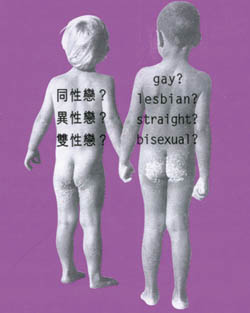 Online
Edition
Online
Edition | From
the editor Letters to the editor Milestone Answerman Periscope Campus Life Social Issues People Photo Features Education Channel Culture & Leisure Science |
| Last
Issue Archive |
| About
Varsity Advertise Media Links CUHK homepage JLM homepage |
Also
in Social Issue
University students as hospice care
volunteers
Related
Links
The Society
for Truth and Light
Department of Applied Social Studies of PolyU
Cultural
differences
Foreign
politically active gays & local silent gays
By Dick Lee
Gayness
has always been taboo.
When
people talk about gays, nasty bars, sissy behaviour and casual sex in
public toilets often come to mind.
The
Society for Truth and Light is one of the groups that publicly condemn gay
lifestyles.
The
general secretary of the group, Mr. Choi Chi Sum, said, “The lifestyle
of gay men is quite unhealthy and unethical.”
He
said that in some countries, promiscuous sex, taking drugs, and being
infected with Aids are much more prevalent among gays than among
heterosexual men.
Said
he: “This situation can partly be applied to Hong Kong. The lifestyle of
gay men is always related to negative things.
“The
Hong Kong community should condemn gayness.”
Mr.
Albert Luk, senior executive of The Satsanga, a local gay care group,
strongly disagreed with Mr. Choi’s viewpoint.
He
said there is a fallacious understanding of gay men’s lifestyles.
Said
he: “People often associate gay men with unsafe sex and decadent lives.
“In
fact, not every gay man has such a lifestyle. Different people have
different attitudes and needs.
“Unsafe
sex, unfaithful husbands, nasty night clubs and one night stands all exist
in non-gay circles. Can you
say that the lifestyles of all heterosexual men are unethical?”
Travis
Kong is an assistant lecturer in the Department of Applied Social Science
at Hong Kong Polytechnic University.
Mr.
Kong conducted research on gay lifestyles and self-identity.
He
found that instead of having gay movements and parades regularly like
their foreign counterparts, local gay men keep a low profile but have a
highly consumerist lifestyle.
Said
he: “They may present their identities by wearing accessories like
earrings or by wearing clothes designed by gay artists.
“They
talk to one another using jargon.”
Examples
of gay jargon include “member” which means “gay man”; “1 or
0”, which means “take care of others or being taken care by a
boyfriend”; and “go fishing”, which means “go hunting for
partners”.
He
said political activism is not on the agenda.
Mr.
Chung To, a local gay rights activist, agrees.
“The
highly consumer-oriented culture of gay men has led to increased
choices in entertainment for them,” said he.
Yet
Mr. Chung said that gay men someday will be bored of these superficial
things.
“This
culture inhibits gay men from engaging in meaningful activities like
gay-rights protests.
“Instead
of entertainment, they should put more effort into external affairs by
increasing communication with the non-gay circle,” said Mr. Kong.
He
proposed setting up alternative gay organisations like a gay teachers’
union and a gay reading society.
Though
gay groups have flourished, some gay men are frustrated with the
public’s perception of them.
Mr.
Eric Tang, a 21-year-old gay university student, is one of them.
He
refuses to join gay-rights groups because he does not want to expose his
identity.
Said
he: “I am afraid that my friends will look at me in a strange way after
knowing my sexual orientation.”
Mr.
Tang exemplifies the pressure and grievances of many local gay men.
Nevertheless,
some local gay men do find ways to enjoy their lives and have adopted a
positive lifestyle.
Mr.
Echo Kwong is one of them.
He
is the partner of Mr. Edward Spodick, the webmaster of the website Gay and
Lesbian Hong Kong.
He
said gay men should accept their identities first before they encourage
others’ acceptance.
Mr.
Tang further attributed discrimination against gayness to public
ignorance.
Said
he: “The public does not know much about the lifestyle of gay men.”
However,
regardless of public discrimination, gay organisations continually being
developed.
In
1991, homosexuality was decriminalised. Since then, gay organisations have
flourished because they can register as legal societies.
Local
gay organisations like The Satsanga regularly organise actvities to enrich
gay life and to promote optimism in the gay community. ![]()
|
Courtesy
of Horizons
 |